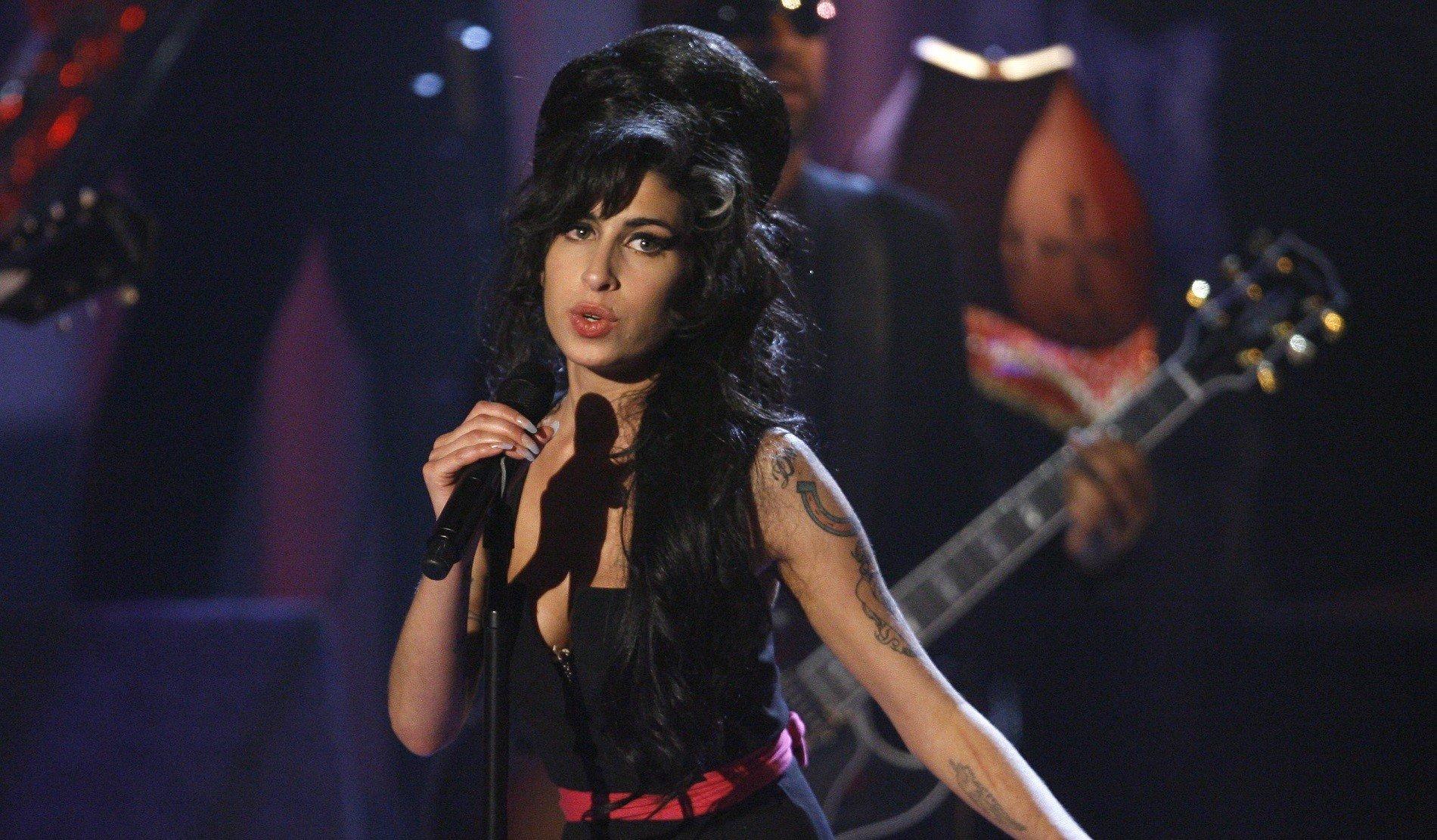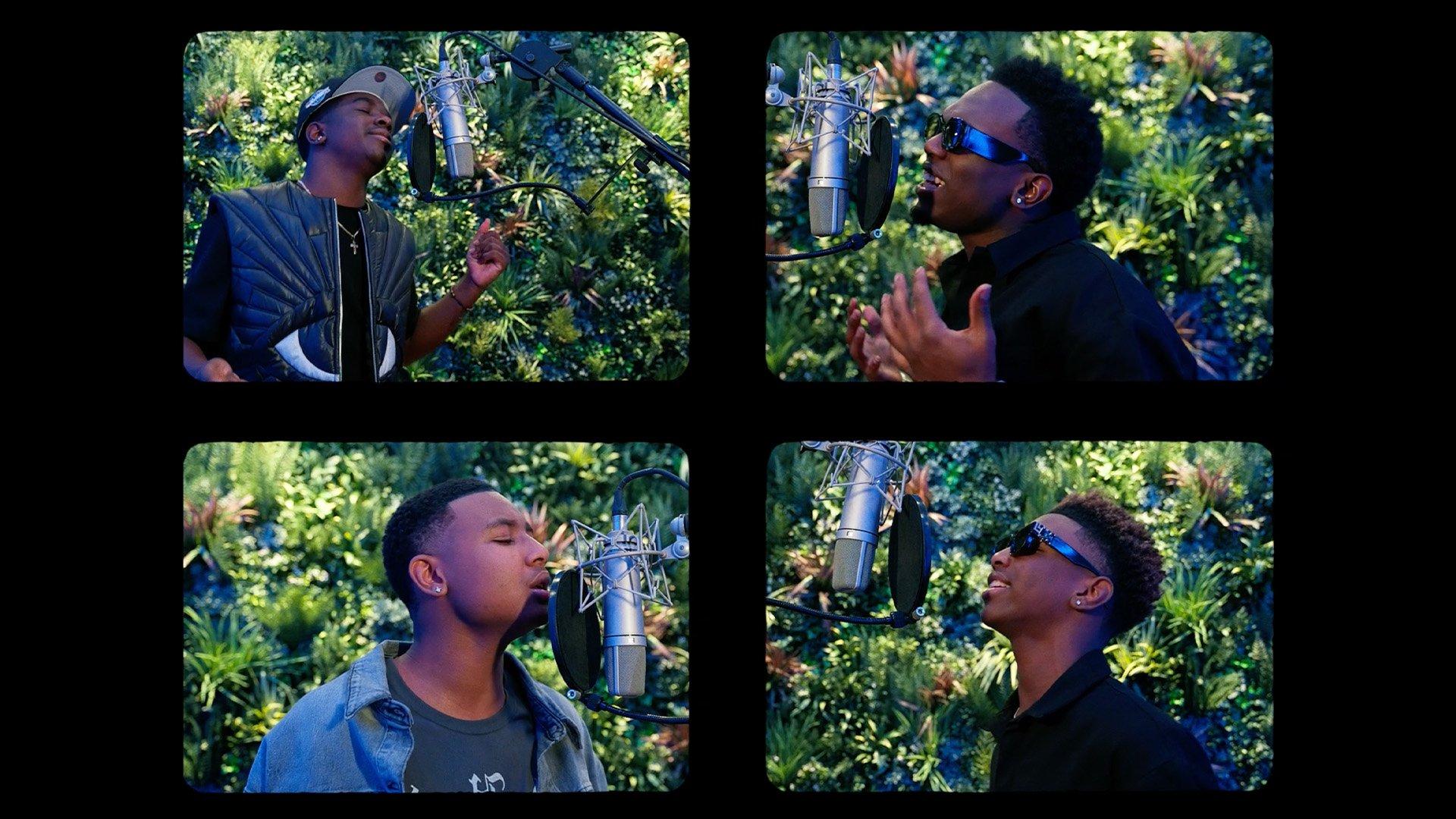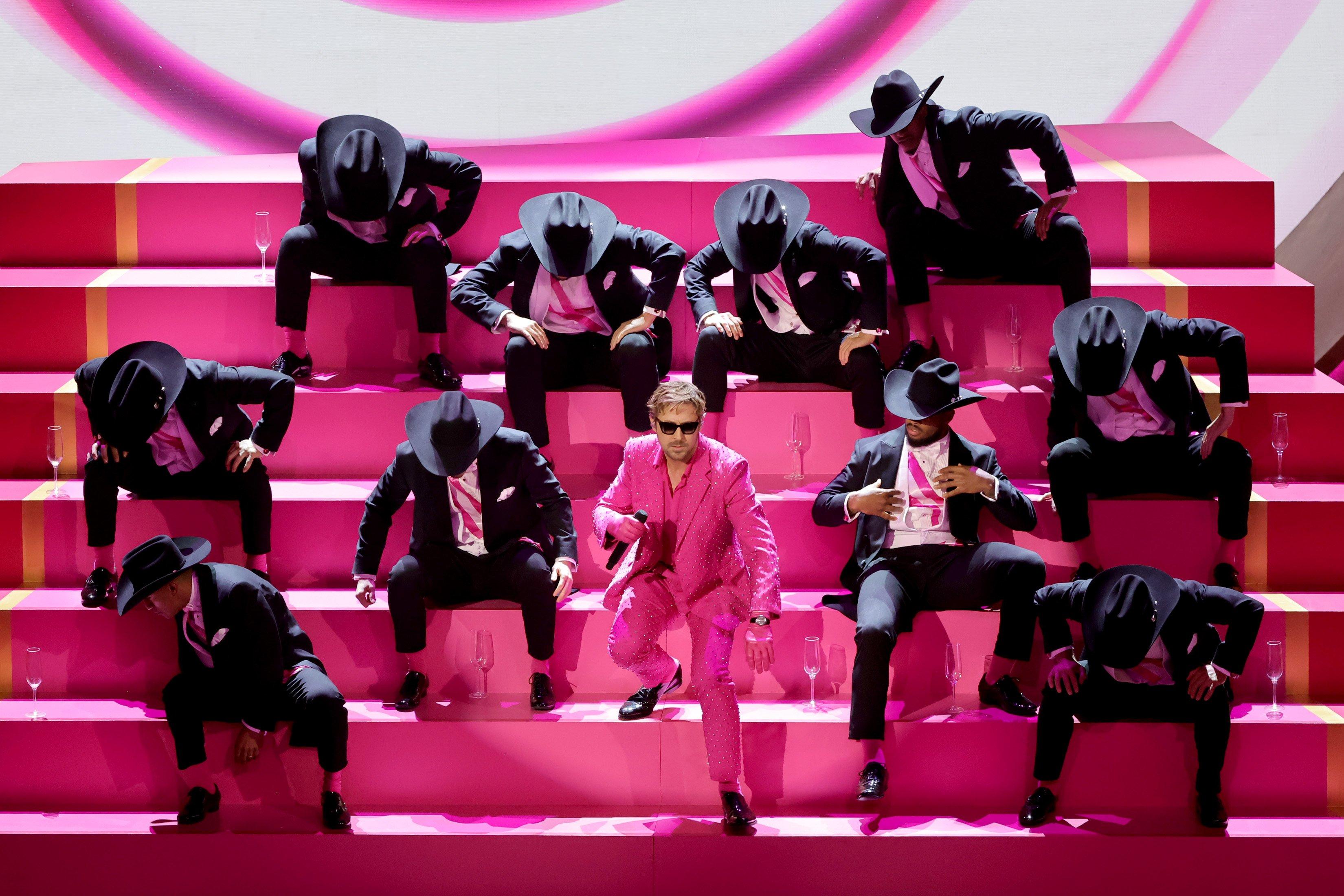Photo: Courtesy of Dylan Chambers

video
ReImagined: Watch Dylan Chambers Channel Bruno Mars In This Groovy Cover Of "Uptown Funk"
Pop-soul newcomer Dylan Chambers offers his rendition of "Uptown Funk," Mark Ronson and Bruno Mars' infectious 2014 hit.
In the latest episode of ReImagined, soul-pop newcomer Dylan Chambers delivers a fresh, heartfelt take on "Uptown Funk", using an electric guitar to drive the performance.
In the year of its inception, Mark Ronson and Bruno Mars' "Uptown Funk" quickly made strides across the map, from a No. 1 peak on the Billboard Hot 100 to a Record Of The Year and Best Pop Duo/Group Performance win at the 2014 GRAMMYs. Ten years after its release, it is the ninth most-viewed YouTube video of all-time and was named one of Billboard's "Songs That Defined The Decade."
Chambers named Mars as one of his most influential inspirations and praised Silk Sonic's Las Vegas residency as one of the "greatest concerts" he has attended in an interview with Muzic Notez.
"Don't believe me, just watch," Chambers calls in the chorus, recreating its notable doo-wop ad-libs with the strums of his instrument.
Chambers dropped his latest single, "I Can Never Get Enough" on April 10, following his March release "High (When I'm Low)." Both tracks will be a part of his upcoming EP, For Your Listening Pleasure!, out May 17.
Press play on the video above to watch Dylan Chambers' groovy rendition of Bruno Mars & Mark Ronson's "Uptown Funk," and check back to GRAMMY.com for more new episodes of ReImagined.

Photo: Chris Polk/FilmMagic
list
How Amy Winehouse's 'Back To Black' Changed Pop Music Forever
Ahead of the new Amy Winehouse biopic 'Back To Black,' reflect on the impact of the album of the same name. Read on for six ways the GRAMMY-winning LP charmed listeners and changed the sound of popular music.
When Amy Winehouse released Back To Black in October 2006, it was a sonic revelation. The beehive-wearing singer’s second full-length blended modern themes with the Shangri-Las sound, crafting something that seemed at once both effortlessly timeless and perfectly timed.
Kicking off with smash single "Rehab" before blasting into swinging bangers like "Me & Mr. Jones," "Love Is A Losing Game," and "You Know I’m No Good," Black To Black has sold over 16 million copies worldwide to date and is the 12th best-selling record of all time in the United Kingdom. It was nominated for six GRAMMY Awards and won five: Record Of The Year, Song Of The Year, Best New Artist, Best Female Pop Vocal Performance, and Best Pop Vocal Album.
Winehouse accepted her golden gramophones via remote link from London due to visa problems. At the time, Winehouse set the record for the most GRAMMYs won by a female British artist in a single year, though that record has since been broken by Adele, who won six in 2011.
Written in the wake of a break-up with on-again, off-again flame Blake Fielder-Civil, Black To Black explores heartbreak, grief, and infidelity, as well as substance abuse, isolation, and various traumas. Following her death in 2011, Back To Black became Winehouse’s most enduring legacy. It remains a revealingly soulful message in a bottle, floating forever on the waves.
With the May 17 release of Sam Taylor-Johnson’s new (and questionably crafted) Winehouse biopic, also titled Back To Black, it's the perfect time to reflect on the album that not only charmed listeners but changed the state of a lot of popular music over the course of just 11 songs. Here are five ways that Back To Black influenced music today.
She Heralded The Arrival Of The Alt Pop Star
When Amy Winehouse hit the stage, people remarked on her big voice. She had classic, old-time torch singer pipes, like Sarah Vaughn or Etta Jones, capable of belting out odes to lost love, unrequited dreams, and crushing breakups. And while those types of singers had been around before Winehouse, they didn’t always get the chance — or grace required — to make their kind of music, with labels and producers often seeking work that was more poppy, hook-packed, or modern.
The success of Back To Black changed that, with artists like Duffy, Adele, and even Lady Gaga drawing more eyes in the wake of Winehouse’s overwhelming success. Both Duffy and Adele released their debut projects in 2007, the year after Back To Black, bringing their big, British sound to the masses. Amy Winehouse's look and sound showed other aspiring singers that they could be different and transgressive without losing appeal.
Before she signed to Interscope in 2007, "nobody knew who I was and I had no fans, no record label," Gaga told Rolling Stone in 2011. "Everybody, when they met me, said I wasn’t pretty enough or that my voice was too low or strange. They had nowhere to put me. And then I saw [Amy Winehouse] in Rolling Stone and I saw her live. I just remember thinking ‘well, they found somewhere to put Amy…’"
If an artist like Winehouse — who was making records and rocking styles that seemed far outside the norm — could break through, then who’s to say someone else as bold or brassy wouldn’t do just as well?
It Encouraged Other Torch Singers In The New Millenium
Back To Black might have sounded fun, with swinging cuts about saying "no" to rehab and being bad news that could seem lighthearted to the casual listener. Dig a little deeper, though, and it’s clear Winehouse is going through some real romantic tumult.
Before Back To Black was released, Fielder-Civil had left Winehouse to get back together with an old girlfriend, and singer felt that she needed to create something good out of all those bad feelings. Songs like "Love Is A Losing Game" and "Tears Dry On Their Own" speak to her fragile emotional state during the making of the record, and to how much she missed Fielder-Civil. The two would later marry, though the couple divorced in 2009.
Today, young pop singers like Olivia Rodrigo, Taylor Swift, and Selena Gomez are lauded for their songs about breakups, boyfriends, and the emotional damage inflicted by callous lovers. While Winehouse certainly wasn’t the first to sing about a broken heart, she was undoubtedly one of the best.
It Created A Bit Of Ronsonmania
Though Mark Ronson was already a fairly successful artist and producer in his own right before he teamed with Winehouse to write and co-produce much of Back To Black, his cred was positively stratospheric after the album's release. Though portions of Back To Black were actually produced by Salaam Remi (who’d previously worked with Winehouse on Frank and who was reportedly working on a follow-up album with her at the time of her death), Ronson got the lion’s share of credit for the record’s sound — perhaps thanks to his his GRAMMY win for Best Pop Vocal Album. Winehouse would even go on to guest on his own Version record, which featured the singer's ever-popular cover of "Valerie."
In the years that followed, Ronson went on to not only produce and make his own funky, genre-bending records, but also to work with acts like Adele, ASAP Rocky, and Paul McCartney, all of whom seemingly wanted a little of the retro soul Ronson could bring. He got huge acclaim for the funk-pop boogie cut "Uptown Funk," which he wrote and released under his own name with help from Bruno Mars, and has pushed into film as well, writing and producing over-the-top tracks like A Star Is Born’s "Shallow" and Barbie’s "I’m Just Ken." To date, he’s been nominated for 17 GRAMMY Awards, winning eight.
Ronson has always acknowledged Winehouse’s role in his success, as well, telling "BBC Breakfast" in 2010, "I've always been really candid about saying that Amy is the reason I am on the map. If it wasn't for the success of Back To Black, no one would have cared too much about Version."
Amy Showcased The Artist As An Individual
When the GRAMMY Museum hosted its "Beyond Black - The Style of Amy Winehouse" exhibit in 2020, Museum Curator and Director of Exhibitions Nicholas Vega called the singer's sartorial influence "undeniable." Whether it was her beehive, her bold eyeliner, or her fitted dresses, artists and fans had adopted elements of Winehouse’s Back To Black style into their own fashion repertoire. And though it’s the look we associate most with Winehouse, it was actually one she had truly developed while making the record, amping up her Frank-era low-slung jeans, tank tops, and polo shirts with darker eyeliner and much bigger hair, as well as flirty dresses, vibrant bras, and heels.
"Her stylist and friends were influential in helping her develop her look, but ultimately Amy took bits and pieces of trends and styles that she admired to create her own look," Vega told GRAMMY.com in 2020. While rock ‘n’ rollers have always leaned into genre-bending styles, Winehouse’s grit is notable in the pop world, where artists typically have a bit more of a sheen. These days, artists like Miley Cyrus, Billie Eillish, and Demi Lovato are willing to let their fans see a bit more of the grit — thanks, no doubt, to the doors Winehouse opened.
Winehouse also opened the door to the beauty salon and the tattoo studio, pushing boundaries with not just her 14 different vintage-inspired tattoos — which have become almost de rigeur these days in entertainment — but also with her signature beehive-like bouffant, which hadn’t really been seen on a popular artist since the ‘60s.It’s a frequent look for contemporary pop divas, popping up on artists like Ariana Grande, Lana Del Rey, and Dua Lipa.
The Dap-Kings Got The Flowers They Deserved
Six of Back To Black’s 11 songs, including "Rehab," got their "retro" sound via backing from the Dap-Kings, a Brooklyn-based soul act Ronson recruited for the project.
While Winehouse’s lyrics were mostly laid down in London, the Dap-Kings did their parts in New York. Ronson told GRAMMY.com in 2023 that the Dap-Kings "brought ['Rehab'] to life," saying, "I felt like I was floating because I couldn’t believe anybody could still make that drum sound in 2006." Winehouse and the Dap-Kings met months later after the record was released, and recorded "Valerie." The band later backed Winehouse on her U.S. tour.
Though the Dap-Kings were known in hip musical circles for their work with late-to-success soul sensation Sharon Jones, Back To Black’s immense success buoyed the listening public’s interest in soul music and the Dap-Kings' own profile (not to mention that of their label, Daptone Records).
"Soul music never went away and soul lovers never went away, but they’re just kind of closeted because they didn’t think it was commercially viable," Dap-Kings guitarist Binky Griptite said in the book It Ain't Retro: Daptone Records & The 21st Century Soul Revolution. "Then, when Amy’s record hit, all the undercover soul fans are like, I’m free. And then that’s when everybody’s like, Oh, there’s money in it now."
The success of Back To Black also seems to have firmly cemented the Dap-Kings in Ronson’s Rolodex, with the group’s drummer Homer Steinweiss, multi-instrumentalist Leon Michaels, trumpeter Dave Guy, and guitarist/producer Tom Brenneck appearing on many of his projects; the Dap-Kings' horns got prominent placement in "Uptown Funk."
Amy Exposed The Darker Side Of Overwhelming Success
Four years after Winehouse died, a documentary about her life was released. Asif Kapadia’s Amy became an instant rock-doc classic, detailing not only Winehouse’s upbringing, but also her struggles with fame and addiction. It won 30 awards after release, including Best Documentary Feature at the 88th Academy Awards and Best Music Film at the 58th GRAMMY Awards.
It also made a lot of people angry — not for how it portrayed Winehouse, but for how she was made to feel, whether by the British press or by people she considered close. The film documented Winehouse’s struggles with bulimia, self-harm, and depression, and left fans and artists alike feeling heartbroken all over again about the singer’s passing.
The documentary also let fans in on what life was really like for Winehouse, and potentially for other artists in the public eye. British rapper Stormzy summed it up well in 2016 when he told i-D, "I saw the [documentary, Amy] – it got me flipping angry... [Amy’s story] struck a chord with me in the sense that, as a creative, it looks like on the outside, that it’s very ‘go studio, make a hit, go and perform it around the world, champagne in the club, loads of girls’. But the graft and the emotional strain of being a musician is very hard. No one ever sees that part."
These days, perhaps because of Winehouse’s plight or documentaries like Amy, the music-loving population seems far more inclined to give their favorite singers a little grace, whether it’s advocating for the end of Britney Spears’ conservatorship or sympathizing with Demi Lovato’s personal struggles. Even the biggest pop stars are still people, and Amy really drove that point home.
We Only Said Goodbye With Words: Remembering Amy Winehouse 10 Years Later

Photo: Courtesy of WanMor
video
ReImagined: Watch WanMor Deliver A Melodic Cover Of Silk Sonic's "Leave The Door Open"
Sibling quartet WanMor perform a soulful rendition of "Leave the Door Open," the track that helped Silk Sonic make a "clean sweep" at the 2022 GRAMMYs.
In 2022, Bruno Mars and Anderson .Paak had a memorable GRAMMYs night together as Silk Sonic. As .Paak declared on stage, they made a "clean sweep," winning every category in which they were nominated: Best R&B Song, Best R&B Performance, Record Of The Year and Song Of The Year. And it was all thanks to their smash "Leave the Door Open."
In this episode of ReImagined, R&B newcomers WanMor perform a smooth cover of the iconic track. Against a lush greenery backdrop, the foursome each take turns at the mic and come together for some silky harmonies.
"I'ma leave the door open girl/ That you feel that I feel/ And you want me like I want you tonight, baby/ Tell me that you're coming through," they croon with the same swagger Silk Sonic possessed in the 2021 single.
WanMor consists of the four sons of Boyz II Men's Wanyá Morris, with their moniker paying homage to their father's first and last names. Individually, they go by the stage names Big Boy, Chulo, Tyvas, and Rocco.
On March 29, the sibling quartet released their latest project, Alone With You — which also featured their previous singles "BABY" and "Please Don't Go" — via Beautiful Life Productions, Mary J. Blige's 300 Entertainment imprint.
Press play on the video above to watch WanMor's groovy rendition of Silk Sonic's "Leave the Door Open," and check back to GRAMMY.com for more new episodes of ReImagined.

Photo: Courtesy of LØLØ
video
ReImagined: LØLØ Flips Green Day's "Boulevard Of Broken Dreams" Into An Acoustic Jam
Canadian pop-punk singer LØLØ offers a stripped-down rendition of "Boulevard of Broken Dreams," the GRAMMY-winning smash from her childhood inspirations, Green Day.
Almost exactly two decades ago, Green Day traced the story of a lonely teenager, Jesus of Suburbia, in their seventh album, American Idiot. Its most notable chapter, "Boulevard of Broken Dreams," earned the band Record Of The Year at the 2006 GRAMMYs.
In this episode of ReImagined, Canadian pop-punk singer LØLØ delivers her take on the song, an ethereal acoustic version.
LØLØ is a longtime fan of Green Day. In an interview with Kerrang! magazine, she recalled their single "Good Riddance (Time of Your Life)" as the first song she learned to play. She later told idobi Radio that her 2023 track "omg" was "a bunch of intrusive thoughts jumbled into a song, wondering if I will ever be enough, or ever be as cool as Green Day."
This year, LØLØ released two original singles, "poser" and "2 of us," via Hopeless Records.
Press play on the video above to hear LØLØ's fresh rendition of "Boulevard of Broken Dreams," and check back to GRAMMY.com for more new episodes of ReImagined.
Green Day's 'Saviors': How Their New Album Links 'Dookie' & 'American Idiot' Decades Later

Photo: Kevin Winter/Getty Images
video
2024 Oscars: Watch Ryan Gosling And Mark Ronson Perform A Soaring, Hilarious Version Of "I'm Just Ken" From The Motion Picture 'Barbie'
At the 2024 Oscars, Ryan Gosling and Mark Ronson performed an unforgettable version of "What Was I Made For?" [From The Motion Picture Barbie], which is up for Best Original Song at the ceremony.
At the 2024 Oscars, Ryan Gosling and Mark Ronson performed a jubilant version of "I'm Just Ken" [From The Motion Picture *Barbie*], which is up for Best Original Song at the ceremony.
With an effervescent backing of black-suited dancers, Gosling leaned into the universal male yearning of the instant Barbie classic. And the arena rock magnitude was helped along by two guitar shredders who rightly dominate that world: Slash and Wolfgang Van Halen.
As Gosling put it at CinemaCon in 2023, Gosling initially doubted his Kenergy.
"It was like I was living my life and then one day I was bleaching my hair, shaving my legs, wearing bespoke neon outfits, and rollerblading down Venice Beach," he said.
"It came on like a light scarlet fever and then I woke up one day and was like, 'Why is there fake tanner in my sheets? What just happened?'"
2024 Oscars: Watch Performances & Highlights
2024 Oscars: Watch Billie Eilish And FINNEAS Perform A Heartrending Version Of "What Was I Made For?" From The Motion Picture 'Barbie'
2024 Oscars: Watch Ryan Gosling And Mark Ronson Perform A Soaring, Hilarious Version Of "I'm Just Ken" From The Motion Picture 'Barbie'
2024 Oscars Red Carpet: Music Icons & Artists Shine Including Billie Eilish, Mark Ronson, Danielle Brooks & More
2024 Oscars: Billie Eilish and FINNEAS Win Best Original Song For "What Was I Made For?" From The Motion Picture 'Barbie'
2024 Oscars: Watch Becky G Perform "The Fire Inside" From The 2023 Comedy-Drama ‘Flamin’ Hot’
2024 Oscar Nominees Who Have Won A GRAMMY: Billie Eilish, Martin Scorsese & More
2024 Oscars: Watch Jon Batiste Perform A Poignant Rendition Of "It Never Went Away" From The Documentary Film 'American Symphony'
2024 Oscars: Ludwig Goransson's Masterful Composition for 'Oppenheimer' Wins Best Original Score
2024 Oscars: Watch Scott George and the Osage Singers Perform "Wahzhazhe (A Song For My People)" From 'Killers Of The Flower Moon'
'The Last Repair Shop' Filmmakers Share Behind-The-Scenes Stories About Oscar-Winning Documentary
How Afrobeats Star Bobi Wine Took On Uganda’s Dictatorship
Billie Eilish and FINNEAS won the Oscar for Original Song for "What Was I Made For?" [From The Motion Picture Barbie] at the 2024 Academy Awards.
Keep checking this space for more updates on the 2024 Oscars — including GRAMMY winners and nominees who are featured during the big night!
